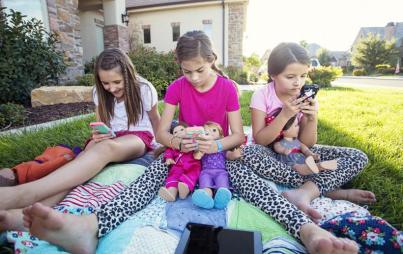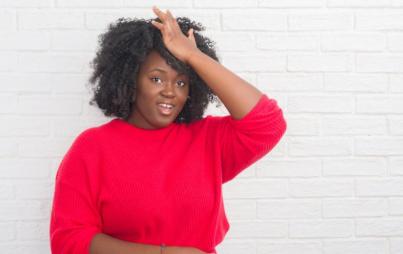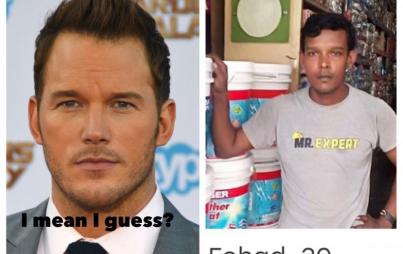
For those of us who fancy the right amount of snark, wit, and insight with our celebrity gossip and red carpet fashion commentary — and who doesn’t? — look no further than The Fug Girls, a.k.a. Heather Cocks and Jessica Morgan. They’re the impressive twosome behind the super popular blog, Go Fug Yourself, which launched back in 2004. Since then, this dynamic duo, whose satirical and sartorial prowess has been lauded by The Guardian, Time, and the New York Times, has live-tweeted basically every awards show ever, while expanding into the realm of YA publishing with two novels, Spoiled and Messy. This year, they expanded their empire by tackling their first adult fiction novel, The Royal We, a love story that’s inspired by one of the most talked-about couples in the history of couples: Prince William and Kate Middleton.
Ravishly caught up with the busy Fug Girls to discuss their friendship/partnership, why they love being “webpreneurs,” and, of course, Princess Kate.
Just so we're all clear: define "fug" for us.
JESSICA: Well, it's traditionally a rather R-rated contraction of "ugly" and a familiar swear word, but we prefer to define it as "fantastically ugly," a self-inflicted (and hopefully entertaining) state.
HEATHER: Yes, "fugly" is something you do to yourself. If a celeb is called out for looking fugly, it's not their person or their DNA we're talking about, it's how they've dressed it.
Okay, so obviously The Royal We was inspired by Prince William and Kate Middleton's relationship. But why did you decide to hone in on that particular story idea for your book? What excited you about it?
J: We came up with the idea in the course of conversation with our agent, Brettne Bloom — to whom the book is dedicated — about Kate in general. We were just shooting the breeze (she must have had an event on the day in question) about how Kate makes everything look so easy, but that it must have been very surreal at best to go from being a regular (if well-off) girl to being married to a prince. And it just grew from there.
H: Love Kate or not, I think anyone can agree that there is no way her journey from being Will's roommate to being his bride was an easy one. And yet she comes off like nothing fazes her at all. She's been composed and dignified throughout. I mean, this is a woman who'd get crucified if she so much as stumbled in her heels or got a blister and started limping. She has to be careful with her face at all times. What if she'd gotten a sunburn on their Australia/New Zealand tour? She can't even screw up her SPF. All those things have to be an absolute pressure cooker — and it got us to wondering about the journey from A to B, and whether she'd pick it all over again even knowing what she does now.
What lessons are there to be learned from a woman in Kate Middleton's, or your character, Bex's, position? Does love/the fairy-tale ending conquer all — even a woman's independence or sense of self?
J: That's something we explore quite a bit in the book. How much of yourself do you — or should you — give up for love? What is the reality behind the fairy tale? Isn't it possible that the fairy tale actually isn't one at all? True love sometimes takes sacrifices — how much are you willing to sacrifice for a person who means the world to you?
H: I think the dream is to find a way to preserve your sense of self through it all. Remember when Beyonce was talking about how her on-stage persona was Sasha Fierce? I hope that Kate has her Catherine, Duchess of Cambridge, persona and then her Kate Middleton self when she's at home with her kids, parents, and husband. I also think the little ways she and William find to show us glimpses of themselves have to help — like their competitive sides, for example, whenever they do anything sports-related as part of a public appearance. Or the fact that Kate likes to be very hands-on with George — she's snuck him out of the palace a few times for a mommy date — and took the new pictures of him and Charlotte herself. There's still a piece of her that hasn't forgotten what normal is, and I think the ideal is to nurture the ordinary as much as possible when your life becomes extraordinary.
Let's go back a bit. Can you talk briefly about how you two first started your blog? How did you meet?
J: We met way back in 2001. We were both writing for the (sadly now defunct) website Television Without Pity, and Heather ended up getting a job here in Los Angeles based on the strength. We decided to get drinks, and we've been friends ever since. Fast-forward a few years and we started GFY, really just as an in-joke with each other. We never thought anyone would ever read it but us.
H: I fell for my work-wife through her writing. Once I moved out to LA, I was like, "Well, I don't know anyone, I'm going to seek out Jessica because I suspect we are going to get along really well."
When did you first start thinking that "Go Fug Yourself" could be a brand?
J: I think the moment we realized that it might have a life of its own would be when we started to be asked to appear on VH1 shows as talking heads — you know, back in the day when VH1 did a lot of programming like, say, "25 Grossest Celebrity Hook-Ups," and the like. We'd occasionally be asked to weigh in on such matters, and for me, that was when I realized we might have something.
H: Defamer also linked to us and tossed off "The Fug Girls" as a nickname, and it stuck, which was exciting. He also used "Gorgeous Ladies of Fug" and sometimes I'm like, "Well, it's a shame that one didn't take . . . "
How has the blogging game changed since you started?
J: We started the blog in 2004, and basically, everything has exploded since then. There are SO MANY blogs now, and I know it must be challenging to find a readership. We were extremely fortunate, with GFY, to find ourselves in the right place at the right time.
H: It's not just about blogs anymore; it's about brands, it's about social media, it's about getting yourself on all kinds of other platforms. We're pretty small when it comes to branching out from the blog itself — we haven't had time to explore a podcast (although we've discussed it, the regular weekly commitment might be too intense), for example. But these days, the blog landscape is so full — and the novelty has worn off — that you need to find other ways to stand out and reach people.
Let's talk about collaboration, both for the book and for the blog. How do you divvy up the workload? What different strengths do you each bring to the table? Do you edit each other's work?
J: The book and the blog are different in terms of working logistics. We do not edit each other's work on the blog at all — I mean, if we see a typo, we will fix it, but we don't edit for content. The blog is strictly first-come, first-served, although we each have a few celebrities that we're in charge of covering (like, Heather always writes Kanye). The book was a different story. We both had to be fully immersed in it, so, essentially, we [wrote] a hugely detailed outline together and then trade[d] the manuscript back and forth, editing each other's work and then adding our own.
H: With our YA novels, we were able to write successive chapters at the same time, and then pass them to each other. Whoever was marrying those two would do it, and the other would forge ahead to the next. Then we'd take a turn with the composite manuscript, discuss our overall notes, and go from there. That worked pretty well with Spoiled and Messy, but with The Royal We, our outline was so enormous that we had to do compressing and deleting and merging on the fly. It would take one of us writing, say, chapter two of Part Two, to be like, "Shoot, we need to get to Buckingham Palace faster," or being like, "A-HA, I just got an idea how we can work in Royal Ascot after all — put it in Part Four instead, and have X happen." So the person who didn't have the book really needed to sit tight and pick up the GFY slack while the other person wrote. New ideas cropped up all the time, or we'd realize in the middle of a section that something coming up didn't make sense, etc. One-at-a-time made more sense.
How did you bang out the book, and work on the website at the same time? How difficult was that? What was a "normal" work day like?
J: We did do that, and it was very difficult. I mean, let's get real: it wasn't, like, Coal Miner Difficult, or Hostage Negotiator Difficult. We were at home in yoga pants. But it was a lot of work. I basically did not leave the house for a year. We were typing every day, sometimes 15 hours a day, sometimes even more. It resulted in a book we are extremely proud of, but it wasn't great for my health.
H: Our break from typing the book was to turn around and type something for GFY. And the draft was long, and we had to read it and reread it so many times — for proofing and for trims. When we were at that stage, we'd each break away and read it and take notes, and then come back together: "OK, I have something on page 40, do you have anything before that?" "Yep, I've got three before that." "OK, fire away." And so on. That could take days, because we'd need to discuss the tweaks and fixes. We frequently worked until the wee hours of the morning and then did it all over again the next day. We also often worked through weekends. My kids started asking, every Friday, "Is Daddy working tomorrow? And are you working tomorrow? Do we get family time?" Ugh, let me tell you, that killed me. An annual family weekend away with friends ended up falling three weeks before the book was due, and I should have stayed home, but I couldn't bring myself to — so I brought my laptop and worked on the book every night after the kids went to bed, while my husband hung out with our friends.
There's a lot of heavy lifting behind the scenes when it comes to owning and writing a blog. What's the best part of being a "webpreneur"?
J: I love, love, love getting to meet our readers. Fug Nation is amazing — funny and friendly and smart — and we are so lucky to get to chat with them daily. Getting to meet them at book signings is honestly the best thing. It's wonderful, and so are they.
H: I've been lucky that we get to make our own hours. It means I'm available for my kids in a way I wouldn't otherwise be. We still need childcare help, but if one of them is sick and the other is not, we can divide and conquer. I've been able to volunteer every week in my kids' classroom, which means I have a relationship with their teacher and the other kids and parents. I can get my hair done and go grocery shopping. I can do things during regular business hours because a lot of my work on GFY can get done after the boys are in bed, because that's when the photos are trickling in from all the events.
What's on the horizon for you? Another book? A sequel to The Royal We?
J: We are definitely going to write another book — and we'd love to write more about these characters! — but we haven't figured out specifically what our next project is going to be yet.
H: We love writing books, so as long as anyone wants to read one from us, we'll want to churn it out. I think we'll write something else before we return to the Royal We universe, just to give the characters time to live their lives, but I hope we'll get to revisit them someday.







